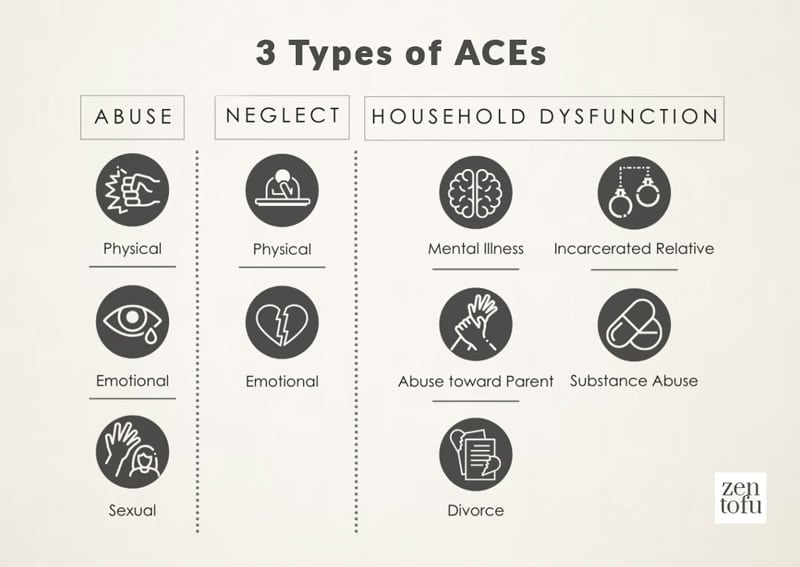Childhood emotional neglect is a silent trauma, often overshadowed by other forms of abuse and trauma. It can be challenging to identify and heal because it’s not easy to pinpoint exactly when and where the wounds occur. It can be easily overlooked as it is often unintentional and may align with cultural or societal standards that deem it acceptable, further perpetuating its hidden nature.
Physical abuse leaves visible scars, while emotional abuse inflicts psychological wounds. But what about childhood emotional neglect? Unlike abuse, where parents do something to a child, emotional neglect is the result of the parents’ failure to act. It happens when parents or caregivers don’t respond enough to a child’s emotional needs when they fail to provide the necessary emotional support and validation that children need. Even if our parents tried their best and loved us deeply, they may still have neglected our emotional needs.
In this article, we will explore the insidious and overlooked wounds of childhood emotional neglect, shedding light on the silent scars it leaves behind and the void it creates within us. By understanding the impact of emotional neglect, we can begin the healing process and reclaim our emotional resilience.
What is Childhood emotional neglect?
Childhood emotional neglect occurs when parents or caregivers regularly fail to provide the basic emotional support and affection that children need for healthy development. When parents fail to notice, attend to, or respond appropriately to a child’s feelings. minimize, dismiss, or invalidate our emotions, treating them as unimportant, excessive, or less significant than other matters, it can leave us feeling unseen, unheard, and disconnected on an emotional level.
Warmth, understanding, and validation are essential for our well-being. However, in the context of emotional neglect, these foundational needs remain unmet, creating an emptiness where nurturing and emotional connection should have thrived. When this happens, our emotional compass, which should guide us through life’s complexities, becomes obscured, and we are left navigating with an incomplete map.
Recognizing the Importance of Emotional Nurturing During Childhood
Emotional nurturing in childhood lays the foundation for our emotional well-being as adults. It’s not just about our parents being physically present but also about how they connected with and responded to our emotional world.
We all require emotional nurturing to grow and flourish. When we have secure emotional bonds with our parents or caregivers, it helps us develop a strong sense of self-worth, empathy, and the ability to cultivate healthy relationships.
If you didn’t receive adequate nurturing during your childhood, you may struggle with low self-esteem, have difficulty expressing emotions, and face challenges in building and maintaining deep connections. Trusting others might be hard for you, and you may often question your own worthiness of love and validation.
Unintentional Nature of Emotional Neglect
One challenging aspect in identifying childhood emotional neglect is that it often happens unintentionally. Most parents who end up failing to meet their children’s emotional needs are actually trying their best. They may not have realized the impact of their actions or may have been dealing with their own struggles.
And many of us find ourselves trying to make sense of it all, saying things like, “They didn’t mean it” or “That’s just how they were.”
Why parents may unintentionally neglect their children’s emotions
There are many reasons why parents might unintentionally fail to attune to their children’s emotions. Maybe they were too caught up in their own lives, juggling work, finances, or personal challenges such as job loss, divorce, depression, or illness, that they couldn’t fully tune in to your feelings. They might have lacked the knowledge and understanding of how important emotional support is for you. Or perhaps they grew up in environments where emotions were dismissed or ignored, so they didn’t know how to provide the emotional nourishment that you needed.

Separating intent from impact
It’s important to recognize that even when the parents’ emotional neglect isn’t intentional, it still can have a profound impact on us. It can leave us feeling unseen, unheard, and emotionally disconnected. The absence of intention doesn’t diminish the pain and hurt we may experience.
Imagine a young tree growing in a barren land. Despite its earnest efforts to reach for sunlight, the tree receives minimal nurturing from the harsh soil. The lack of essential nutrients hampers its growth and diminishes its vibrant potential.
Childhood emotional neglect is like the lack of nurturing for a growing tree. It’s not always a deliberate act of withholding emotional support and affection but rather an environment where the necessary emotional nutrients are scarce or absent. Just as the tree’s growth is impeded by the arid soil, emotional neglect inhibits our emotional development and well-being.
Behavioral patterns that can lead to childhood emotional neglect
In order to heal from the wounds of childhood emotional neglect and break free from repeating the same relational dynamics, it’s important to understand the behaviors that can contribute to this form of neglect. Our goal is to approach this exploration with empathy, understanding, and a commitment to personal growth.
By examining these behavioral patterns, we can gain insights into our own experiences as well as the experiences of others. If you’re a parent and feel that you may have fallen short at times, it’s essential to remember that parenting is a journey of learning, and we all make mistakes along the way. Don’t forget to be gentle with yourself and have self-compassion.
By deepening our understanding of these patterns, we can create a more nurturing environment for ourselves and our loved ones. Instead of judgment or blame, let’s foster an atmosphere of empathy and growth as we strive to build healthier relationships.
1. Emotional Unavailability or Disconnection:
Being emotionally unavailable can create a significant barrier to fulfilling the emotional needs of the children. This may manifest as consistently being preoccupied, distant, or emotionally detached. When parents are emotionally unavailable, they inadvertently send the message that their children’s emotions are not important or worthy of attention, hindering their emotional development.
2. Lack of Emotional Responsiveness:
When parents fail to respond promptly and empathetically to their children’s emotional needs, they may feel ignored or invalidated. Emotional responsiveness involves actively listening, empathizing, and validating our children’s emotions, helping them develop a sense of emotional security.
3. Inconsistent Responsiveness:
Consistency in responding to our children’s emotional cues is crucial for building trust and a sense of security. When our responses are unpredictable or inconsistent, children may feel confused and unsure of how to navigate their emotions effectively. They may learn to suppress their feelings or seek other means to cope, potentially leading to long-term emotional difficulties.
4. Dismissing, Minimizing, and Invalidating Children’s Emotions:
When parents treat children’s emotions as unimportant, not valid, excessive, or of lesser importance than other issues, they neglect the child emotionally. Some things that parents might say without giving much thought can completely disregard and downplay children’s feelings:
- “Stop being so sensitive”
- “Boys don’t cry.”
- “It’s nothing, stop over-reacting”
- “You don’t really feel that way.”
- “It wasn’t that bad.”
- “It’s not worth getting upset about.”
- “You are such a drama queen.”
When this happens, children internalize the belief that their feelings don’t matter or that there’s something wrong with the way they feel. This can hinder their ability to understand and regulate their emotions. Encouraging open and non-judgmental communication about emotions allows children to develop a healthy emotional vocabulary and a sense of emotional validation.
5. Overwhelming Children with Our Own Emotions:
Sometimes, in our own emotional struggles, we may unintentionally overwhelm our children with our own emotions. Whether it’s sadness, anger, or anxiety, when we burden them with our emotional weight without providing them the support they need, it can lead to emotional neglect. Children may feel responsible for managing their parent’s emotions or become overwhelmed by the intensity, leaving their own emotional needs unaddressed.
6. Fearing Children’s Emotions:
When we fear our children’s emotional reactions and attempt to stop or suppress their strong emotions, it can have detrimental effects. When children are consistently told to “calm down” or “You are ok, there is no reason to cry” they may start to suppress their emotions or believe that there is something wrong with them for experiencing these emotions. This can lead to an internalization of their emotions and difficulties in understanding and expressing their feelings in a healthy manner.
7. Lack of Affectionate Expressions:
A lack of affectionate gestures, such as hugging, cuddling, and verbal expressions of love, can leave children feeling emotionally disconnected and unimportant. Expressing these small gestures of affection can provide a sense of safety, comfort, and love, and strengthen the bond and emotional connection between us and our children. It also helps children develop a positive sense of self-worth.
8. Absence of Empathy and Understanding:
Empathy is the ability to understand and share the feelings of another person. When we struggle to empathize with our children’s experiences or fail to provide the understanding they need, it may unintentionally create emotional distance and hinder their ability to develop secure emotional connections. They may feel unseen and unheard, leading to a sense of emotional isolation.
9. Disengaged and Uninvolved Parenting:
Disengaged and Uninvolved Parenting: Being disengaged and uninvolved in our children’s lives can create a void of emotional connection. When we fail to actively participate in their activities, show interest, or engage in their emotional world, children may feel unsupported and emotionally neglected.
10. Overly Strict Parenting Style:
Imposing excessively strict rules and punishment without considering a child’s emotional needs can contribute to emotional neglect. When discipline becomes rigid and lacks empathy, it can create emotional distress and hinder the development of a secure emotional bond.
11. Failing to Recognize the Child’s Cues for Help:
When a child’s cries for help or distress signals go unnoticed or unaddressed, they may feel ignored, invalidated, and emotionally disconnected.
12. Excessive Criticism and Persistent Fault-Finding:
The constant focus on flaws and negative feedback, or consistently criticizing and finding fault in a child’s words, actions, or behaviors can lead to self-doubt and erode their self-worth.
13. Disciplining children through withholding affection or attention:
When we use love and connection as bargaining chips or leverage for compliance, it can leave a deep impact on the child. For example, a child might misbehave, and instead of addressing the behavior and offering guidance, parents might resort to coldness or emotional withdrawal. They may intentionally distance themselves (including time out), stop showing affection, or give the child silent treatment as a form of punishment. This pattern of discipline teaches the child that their worthiness of love and affection is conditional upon their behavior, creating emotional insecurity and a fear of rejection.
14. Belitteling, Making Fun About Mistakes or Emotional Responses:
Sometimes, adults unintentionally hurt children’s feelings by making a funny story or a joke about how a child made a mistake, or how they were perceived as naive, sensitive, or overly emotional. When a child’s errors or emotional responses are treated as sources of amusement, it can undermine their self-esteem, create emotional distance, and discourage them from seeking support or expressing their true emotions. Such experiences can make the child feel ashamed or embarrassed, leading to a reluctance to open up and share their feelings in the future.
15. Gender-stereotypical upbringing:
When we impose rigid expectations and limitations based on the norms of our society surrounding gender roles, we don’t give children the space to express themselves authentically. We fail to consider what they really need to thrive emotionally and end up suppressing their true emotions.
For example, if a family expects boys to be tough, stoic, and not show vulnerability or sensitivity, they may discourage or dismiss their emotional experiences. This can lead to boys feeling unsupported in expressing their emotions and facing difficulties in understanding and managing their feelings later in life.
Similarly, if girls are consistently taught to prioritize nurturing others, be passive, or suppress their anger and assertiveness, their emotional needs may be neglected. They may learn to prioritize the emotional needs of others over their own, leading to self-neglect and difficulties in setting boundaries or expressing their true emotions.

- Learn more about other forms of abuse and Adverse Childhood Experiences in this article.
Considering Cultural Perspectives
Let’s take a moment to explore the significance of cultural perspectives when it comes to childhood emotional neglect. As someone who has experienced the nuances of diverse cultures firsthand, including my Japanese heritage, and having worked with clients from various backgrounds, I understand the tendency to downplay the impact of childhood experiences. We may find ourselves rationalizing away the hurt, saying, “It’s just how parents were back then,” “You know, Asian parents,” or “It’s part of our culture.” But let’s pause and look deeper into why we may be making such justifications for experiences that may have caused us emotional pain.
Honoring Cultural Diversity in Emotional Expression:
In our multicultural world, it’s essential to recognize that different cultures have distinct norms and values surrounding emotional expression. Some cultures may emphasize emotional restraint or value subtlety in conveying feelings. It’s important to acknowledge and respect these customs. However, let’s remember that emotional neglect goes beyond cultural preferences. It entails emotional indifference, rejection, or withholding when one has a responsibility to provide support and care. It’s about devaluing someone’s emotions.
Recognizing transgenerational patterns of trauma
It’s also important to consider that what might appear as a “cultural norm” could also be influenced by transgenerational patterns shaped by collective trauma. Histories such as war, genocide, slavery, colonialism, and strict regimes of dictatorship or communis have left deep imprints on cultural practices and familial dynamics. These historical factors can contribute to emotionally restrictive environments that perpetuate patterns of emotional neglect. Parents who have experienced a lack of nurturing in childhood from their own parents tend to adopt similar parenting styles when raising their own children. By acknowledging the impact of such collective traumas, we can foster understanding and compassion while seeking to create healthier emotional spaces within our cultural contexts.
Identifying Signs of Childhood Emotional Neglect
When it comes to childhood emotional neglect, the signs may not always be obvious. Everyone’s experience is unique; however, it often manifests in the realms of emotions and relationships. By being aware of certain signs, you can gain a deeper understanding of your own journey.
Here are some common signs that you may have suffered from childhood emotional neglect:
- Difficulty recognizing and expressing emotions: You might find it challenging to identify and articulate your own feelings. You may have grown up suppressing or downplaying your emotions, leading to a sense of emotional disconnection.
- Low self-esteem and self-worth: Growing up without a parent who could truly understand and meet your emotional needs may have led to a profound sense that your emotions and needs are unimportant. As a child, we tend to internalize this belief, thinking, “I am unimportant.” Consequently, you may battle with feelings of inadequacy and a lack of self-confidence.
- Struggling with trust and emotional intimacy: Having experienced a lack of emotional connection in childhood, you may develop a fear of getting close to others or opening up emotionally. Trusting others with your emotions can feel overwhelming or unsafe. You may find yourself guarded, and hesitant to let people in. This can impact your ability to form deep and meaningful connections with others.
- Difficulty setting boundaries: You may have difficulty asserting your needs and expressing your limits, leading to feelings of being taken advantage of or overwhelmed.
- People-pleasing tendencies: Seeking validation and approval from others may become a pattern in your life. You may prioritize others’ needs over your own, in an attempt to feel valued and accepted.
- Chronic self-blame and self-criticism: Growing up with emotional neglect can lead to a harsh inner critic. You may constantly blame yourself for any perceived shortcomings or mistakes, perpetuating a cycle of self-criticism.
- Feelings of emptiness, void, or loneliness: Childhood emotional neglect can leave us with a deep sense of emptiness, a lingering void that seems difficult to fill. We may experience a pervasive sense of loneliness, even when surrounded by others. It’s as if there is something missing, something essential that should have been there but wasn’t. We may ask ourselves, “What is it that’s missing? What can fill this void?”
- Fear of relying on others: Due to the lack of emotional support in childhood, you may have developed a fear of depending on others. You may reject offers of help, support, or care, feeling hesitant to trust that others will be there for you.
- Difficulty identifying strengths, weaknesses, and life goals: You may have a hard time identifying your own strengths and weaknesses, as well as your likes and dislikes. Additionally, setting clear life goals may feel challenging and unclear.
- Lack of self-compassion and understanding: Growing up with emotional neglect can result in being overly critical of yourself. You may find it harder to show self-compassion and understanding, treating yourself more harshly than you would treat others.
- Sensitivity to rejection: Emotional neglect can make you more sensitive to rejection. You may fear rejection and have a heightened sensitivity to any perceived criticism or disapproval from others.
- Feeling easily overwhelmed and giving up quickly: The absence of emotional support can leave you feeling overwhelmed by life’s challenges. You may find it difficult to cope with stress and give up quickly when faced with obstacles.
- Belief in being deeply flawed: Emotional neglect can contribute to a deep-rooted belief that there is something fundamentally wrong with you, even if you can’t specifically identify what it is. You may carry a sense of inherent flaw or unworthiness.
- Anxiety and depression: The absence of emotional support and validation can contribute to feelings of anxiety, low self-worth, and a sense of emptiness. It can also lead to depressive symptoms, such as persistent sadness, loss of interest, and difficulty finding joy in life.
These signs are not definitive proof of childhood emotional neglect, but they can serve as starting points for self-reflection and exploration.
Overcoming and Healing from Childhood Emotional Neglect
If these signs sound familiar to you, and you think you may be a victim of childhood emotional neglect, there are things you can do to heal. It is a journey that requires understanding, awareness, and self-compassion and it may come with its own set of challenges, but with dedication and support, it is possible to reclaim your emotional well-being.
In Childhood Emotional Neglect, your emotional needs have been ignored, and it’s important for you to reconnect with your emotions again and learn to be comfortable with them. Here are some steps to guide you in your healing process.
Recognizing and acknowledging the impact:
The first step is to recognize and acknowledge that you have experienced childhood emotional neglect. This involves understanding how your emotional needs were invalidated or ignored and recognizing how it has affected your emotional well-being and relationships.
Learning to recognize your emotions:
If your parents dismissed or disregarded your emotions, you may struggle as an adult to identify what you feel or how to respond when difficult emotions arise. Without a clear understanding of our emotions, decision-making becomes challenging. Our emotions guide our choices, influencing what we do, where we go, who we spend time with, and even what we eat. They provide valuable information about our world, our relationships, and ourselves.
Validating your emotions:
Give yourself permission to feel and validate the emotions you experience. Recognize that your emotions are important and deserving of attention and care.
Identifying your needs and prioritizing them:
Recognize that you deserve to have your needs met, just like anyone else. Take the time to identify your needs and make them a priority in your life. This could include emotional support, self-care, boundaries, or personal fulfillment.
Cultivating self-awareness:
Develop self-awareness by exploring and understanding the patterns, beliefs, and coping mechanisms that have developed as a result of the neglect. This process of self-reflection allows you to gain insights into your emotions and behaviors.
Challenging negative beliefs:
Challenge negative beliefs that may have been internalized during childhood, such as feelings of unworthiness or unimportance. Replace them with positive and empowering beliefs that affirm your self-worth and value.
Learning to set healthy boundaries:
Set boundaries in your relationships to protect your emotional well-being and prioritize your needs. Communicate your needs and boundaries effectively and assertively, ensuring that they are respected by others.
Asking for help:
Recognize that you are worthy of asking for help and support. Reach out to trusted individuals, such as friends, family, or therapists, who can provide guidance and assistance. Engaging in therapy can be particularly beneficial in working through unresolved emotions and developing healthy coping strategies.
Resources
- Book: “Running on Empty: Overcome Your Childhood Emotional Neglect” by Jonice Webb, PhD
- This book explores the concept of emotional neglect and provides practical strategies for healing and overcoming its effects.
- Book: “The Emotionally Absent Mother: A Guide to Self-Healing and Getting the Love You Missed” by Jasmin Lee Cori, MS, LPC
- Focusing on the mother-child relationship, this book offers insights and guidance for individuals who have experienced emotional neglect from their mothers.
Take Away
Childhood emotional neglect is a silent trauma that can have long-lasting effects on our emotional well-being and relationships. By recognizing its signs and impact, we can gain insight into our own experiences and begin the journey of healing.
Remember, it is possible to heal your emotional wounds. It requires self-compassion, self-awareness, and a commitment to personal growth. By prioritizing our emotional needs, challenging negative beliefs, setting healthy boundaries, and seeking support, we can break free from the patterns of neglect and create a more fulfilling and emotionally balanced life. Embrace the journey of healing, celebrate your progress, and know that you are deserving of love, understanding, and emotional nourishment.






